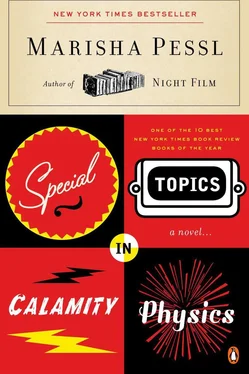“We’d like to move to that table there, s’il vous plaît, ” said Dad.
Despite these rousing environs, I thought about home all the time, about that night with Hannah, the strange stories she told me. As Swithin wrote in State of Affairs:1901–1903 (1902), “Whilst man is in one location, he thinks of another. Dancing with one woman, he can’t help but long to see the quiet curve of another’s nude shoulder; to never be satisfied, to never have the mind and body cheerfully stranded in a single location — this is the curse of the human race!” (p. 513).
It was true. Contented as I was (especially those moments Dad was unaware of the bit of éclair at the corner of his mouth, or when he rattled off a sentence in “perfect” French and was met with confused stares), I found myself staying awake at night, worried about them. And, this is awful to admit, because the correct thing was to be wholly unfazed by what Hannah had told me — I really couldn’t help but see them all in a slightly different light now, a very severe overhead light in which they bore a startling resemblance to smudged street urchins who sang and marched in the chorus of “Consider Yourself” in Oliver! , which Dad and I watched over salty popcorn one dull evening in Wyoming.
After nights such as these, the next morning I found myself squeezing Dad’s arm a little tighter as we dashed in front of traffic crossing the Champs Élysées, giggling a little louder over his comments regarding fat Americans in khaki when a fat American in khaki asked the madame at the pâtisserie counter where the bathrooms were. I began to behave like someone with a grave prognosis, searching Dad’s face all the time, feeling on the verge of tears when I noticed the delicate wrinkles blooming around his eyes, or the prick of black in his left iris, or the frayed cuffs of his corduroy jacket — a direct result of my childhood, of my tugging on his sleeve. I found myself thanking God for these dusty details, these things no one else noticed, because they, fragile as spiderwebs and thread, were the only things separating me from them.
I must have thought about the others more than I realized, because they began to make Hitchcock cameos. I saw Jade on countless occasions. There she was, just in front of us, walking a haughty pug down Rue Danton — wheat-bleached hair, blunt red lipstick, gum and jeans — perfectly jaded. And there was Charles, the thin, sullen blond kid melting into the bar at Café Ciseaux, drinking his café, and poor Milton, beached outside the Odéon Métro with nothing but a sleeping bag and a recorder. With gnarled fingers he played a woeful Christmas song — some sad, four-note tune — his feet raw, his skin heavy as a wet pair of jeans.
Even Hannah made a brief appearance, in what turned out to be the only incident of our stay Dad had not planned (at least, not to my knowledge). There was a bomb scare in the early morning of December 26. Alarms screamed, hallways flashed, all guests in the hotel, as well as employees — bathrobes, bald heads, bare chests a-flying — were emptied out into Place Vendôme like cream of potato soup from a can. Smooth Efficiency, the implacable quality exuded by all Ritz staff, turned out to be nothing more than a flimsy magic spell, valid only when workers were physically inside the hotel. Dumped into the night, they pumpkined back into shivery humans, red-eyed, runny-nosed people with windswept hair.
Naturally, Dad found this dramatic interlude all very exciting, and as we awaited the arrival of the fire brigade (“I imagine we’ll be on France 2,” Dad speculated with glee) in front of a waxen bellboy, draped in rippling silk pajamas the color of peas, I spotted Hannah. She was much older, still slim, but most of her beauty had corroded. The sleeves of her pajamas were rolled up like a truck driver’s.
“What’s going on?” she asked.
“Eh,” said the frightened bellboy. “Je ne sais pas, madame.”
“What d’ya mean tu ne sais pas? ”
“Je ne sais pas.”
“Does anyone know any thing around here? Or are you all just a bunch of frogs on lily pads?”
(The “bomb scare,” to Dad’s evident displeasure, turned out to be nothing more than an electrical malfunction, and the following morning, our last in the hotel, Dad and I awoke to free breakfast in our suite and a note calmly printed in gold, apologizing for le dérangement. )
On the windy afternoon of the 26, we said good-bye to the Ritz and took our suitcases across the city to Baba au Rhum’s five-bedroom apartment, occupying the top two floors of a seventeenth-century stone building on Île St. Louis.
“Not bad, hmmm?” said Servo. “Yes, the girls enjoyed this old shed growing up. All their French friends wanted to come over every weekend, couldn’t get rid of them. How do you like Paris, mmm?”
“It’s extr—”
“Elektra does not like Paris. Prefers Monte Carlo. I agree. Tourists make life difficult for us true Parisians, and Monte’s a theme park you can’t enter unless you have, what, Soc — one, two million? Been on the phone with Elektra all morning. Calls me up. ‘Daddy,’ she says, ‘Daddy, they want me for the embassy.’ Salary they offered her, I fall off my chair. Barely nineteen, skipped three grades. They adore her at Yale. Psyche too. She just started as a freshman. And they still want her for all the modeling, did top modeling in the summers. Made enough to buy all of Manhattan, and what is his name with the underwear, Calvin Klein. He fell madly in love with her. Nine years old, she was writing like Balzac. Her teachers would cry when they read her work, they were always telling me she’s a poet. And poets are born, you see, they’re not made. Only one comes along in a single, what do they say? Mmm? A single century.”
Dr. Michael Servo Kouropoulos was a severely tanned Greek man of many opinions, tales and chins. He was overweight, in his mid-to late sixties with white sheep’s hair and dull brown dice eyes that never stopped rolling around a room. He sweated, suffered from the strange tic of slapping then rubbing in circular motions his own chest, threaded each of his sentences together with a belly-deep “mmm” and treated idle conversations that had nothing to do with his family as if they were termite-infested houses in dire need of being exterminated with another story about Elektra or Psyche. He moved speedily, in spite of the limp that warped his walk and the wooden cane that, after he propped it against some counter while ordering un pain au chocolat, came clattering noisily to the floor, sometimes hitting people on the shin or foot (“Mmmm? Oh, dear, excusez-moi.”).
“He always hobbled,” Dad said. “Even when we were at Harvard.”
As it turned out, too, he was severely averse to having his picture taken. The first time I removed my disposable camera from my backpack, Dr. Kouropoulos put his hand over his face and refused to remove it. “Mmmm, no, I don’t photograph well.” The second time, he disappeared for ten minutes in the Men’s Room. “Excuse me, hate, hate to break up the photo op, but, nature. She’s calling.” The third time, he threw out that shopworn detail people loved to repeat about the Masai people, thereby drawing attention to their sensitivity and savoir faire when it came to primitive cultures: “They say it steals the soul. I don’t want to take any chances.” (This factoid was painfully outdated. Dad had spent time in the Great Rift Valley, and said for five dollars, most Masai under seventy-five would let you steal their soul as many times as you wished.)
I asked Dad what his problem was.
“I’m not sure. But I wouldn’t be surprised if he was wanted for tax evasion.”
Читать дальше












